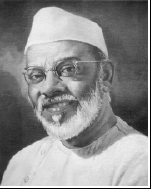He mastered the TNPA and availed of every scheme for the village. "There are enough well meaning schemes announced by the Government. It is up to the local leadership to go and get them," he says. He has been an efficient conduit between his people and available opportunities.
One of the housing concepts that the Tamil Nadu Government promoted was Samathuvapurams [Harmony Estates]. The idea was to make different castes and religions to live together in a campus of about 50 dwellings each. Over 150 came up all over the State. Most were shoddily built mockeries left to fast buck contractors in cahoots with local leadership. Elango demanded --and got-- a say in the design and execution. He got HUDCO to design a soulful campus. Local soil was pressed by people into mud blocks to build the houses. The community hall was designed to be an activity centre where now vocational courses and village businesses are run. The money set aside for that darling of the Government --a commemorative arch-- was used to build a meeting place. Of the Rs.88 Lakhs that the project cost, over a fourth was spent on wages for villagers. More was saved by using local materials. Villagers assimilated many cost effective building technologies. Houses in this Samathuvapuram are about 40% larger and are better designed.
So it is with all activities in Kuthambakkam. Extensive water management works, processing of agricultural produce, collective businesses run by women, all emphasise local involvement.
Economics for village clusters:
This approach recurs in Elango's economic thinking which is deeply influenced by J C Kumarappa. "If you bring in the contractors you are exporting jobs," he says. He got a door-to-door survey done in the village and found the village consumes Rs.60 Lakhs worth of goods and services per month. Elango discovered to his astonishment, that nearly Rs 50 L of that can be produced at the village level. Since then, he has been evolving an economic theory of village clusters. In simple terms about seven or eight villages form a free trade zone. They identify and produce goods and services without overlap. They consume each other's produce. And the money stays back and gets invested in human development. Ever the Gandhian and a Kumarappa acolyte, he challenges the theory of competition as being good at all levels. For villages it is co-operation that holds the key. Extreme Competition Theorists are heartless. 'People have to be able to begin again," says Elango. "especially if they are able to see where things went wrong the first time."
Who was Dr. J C Kumarappa?
Joseph Chelladurai Cornelius was born on Jan 4, 1892 of Tamil stock. He practiced as an accountant in Bombay and later went to the USA to study economics. He earned his doctorate, returned to India, switched to Khadi clothes and became a fervent nationalist. He called himself J C Kumarappa thereafter.

One day in 1929, he arrived at the Sabarmati Ashram and gave Gandhi his doctoral thesis. Gandhi is said to have read it all night in amazement. He found Kumarappa echoing his convictions. Kumarappa had asserted that man was not a wealth producing animal but a social being with spiritual, moral and political instincts. Economics had to take this into consideration. Kumarappa theorised that in an economy of permanence there was planned co-operation. In an economy of transience there was mindless competition.
Kumarappa worked closely with Gandhi throughout his life. But a newly independent India with vaulting socialistic visions had no place for Dr. Kumarappa. He faded away from public view and died in 1961 preaching and demonstrating his theory in Tamil Nadu.
In 1996 Elango read his classic, "The Economy of Permanence" and was transformed. He is attempting to plan anew using Kumarappa's ideas.
The training centre in Kuthambakkam is named after Dr. J C Kumarappa.
